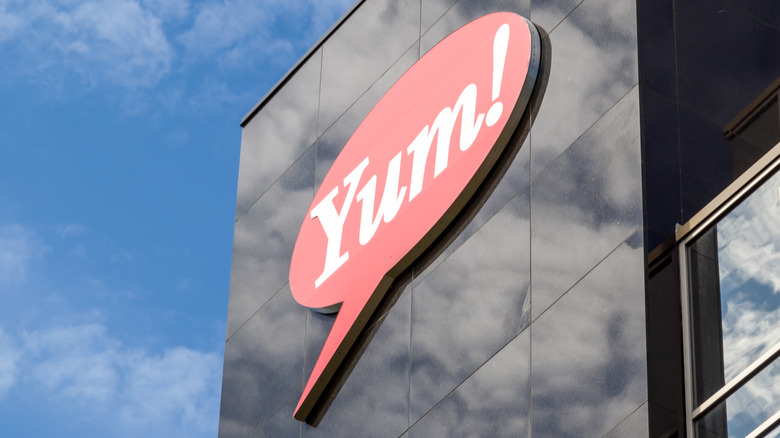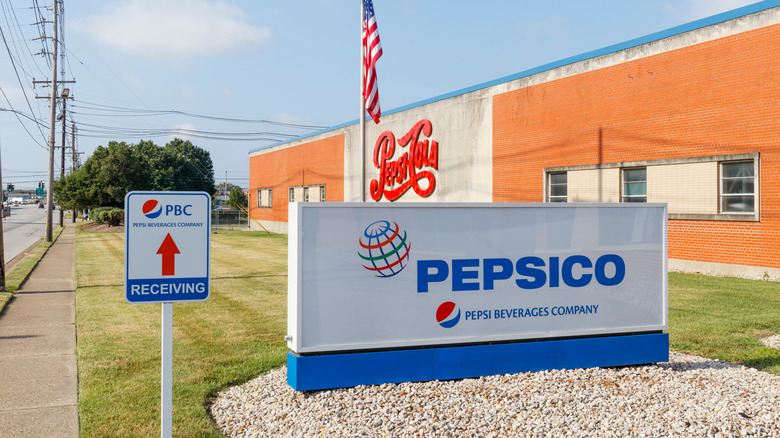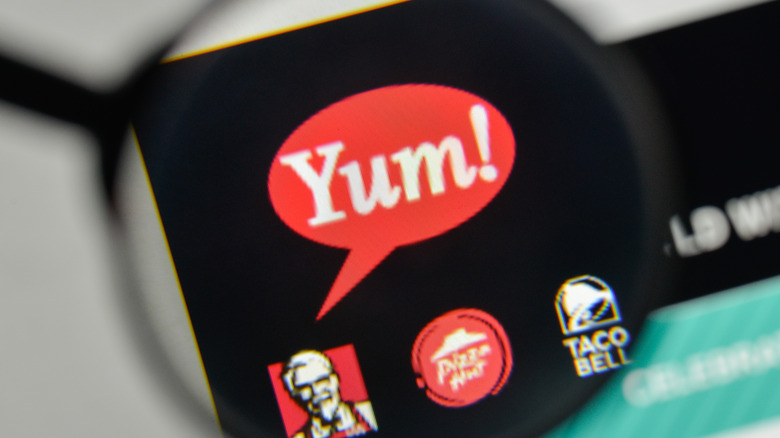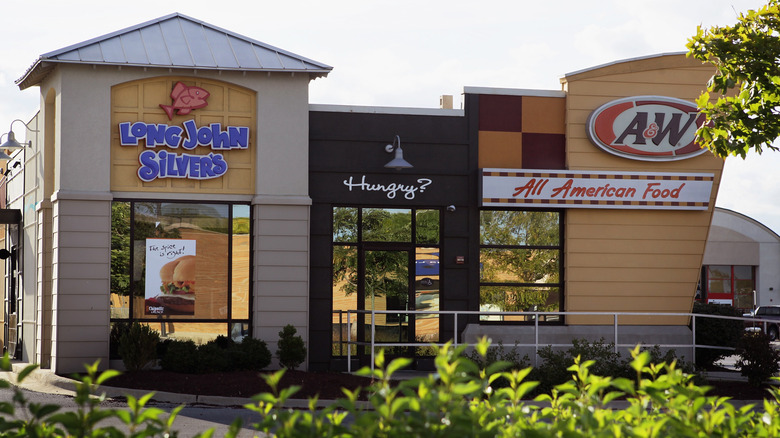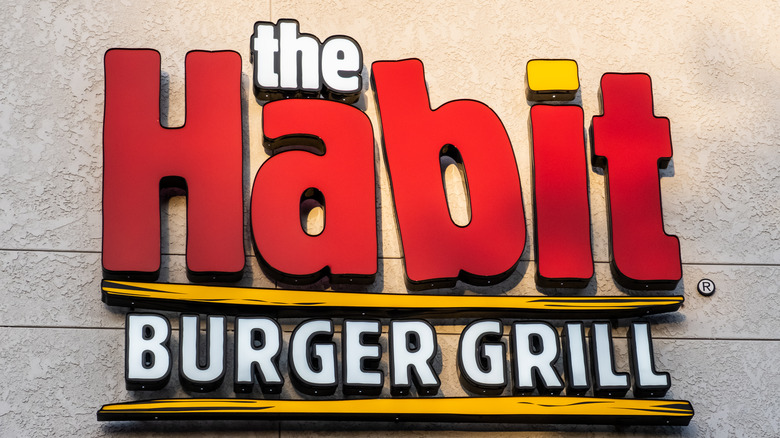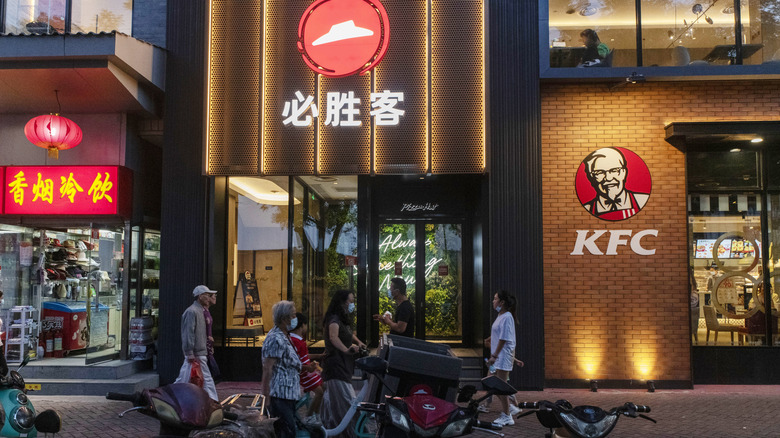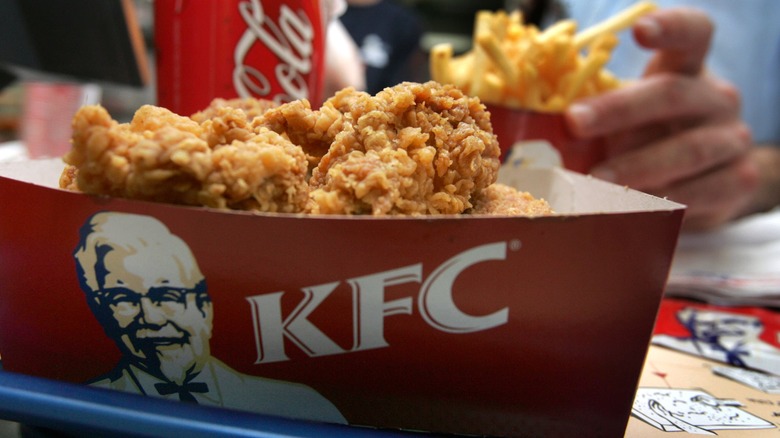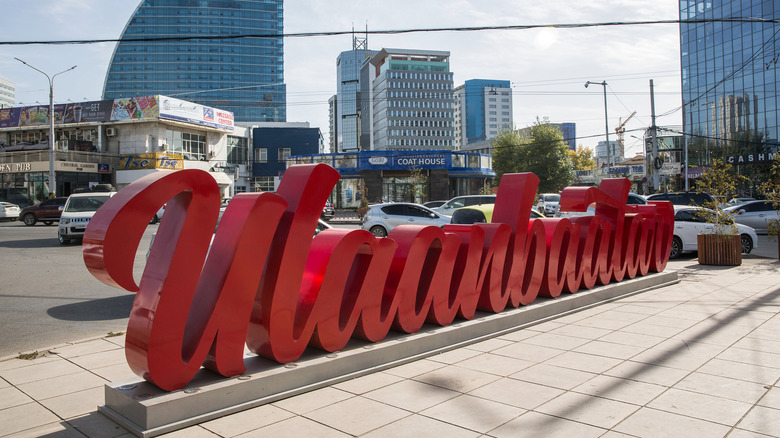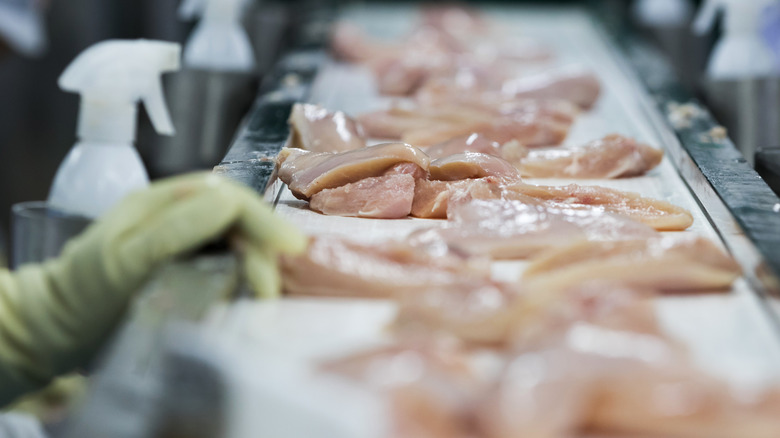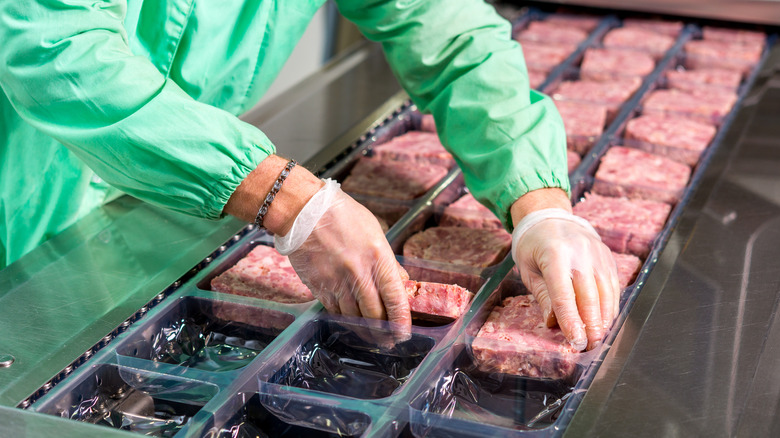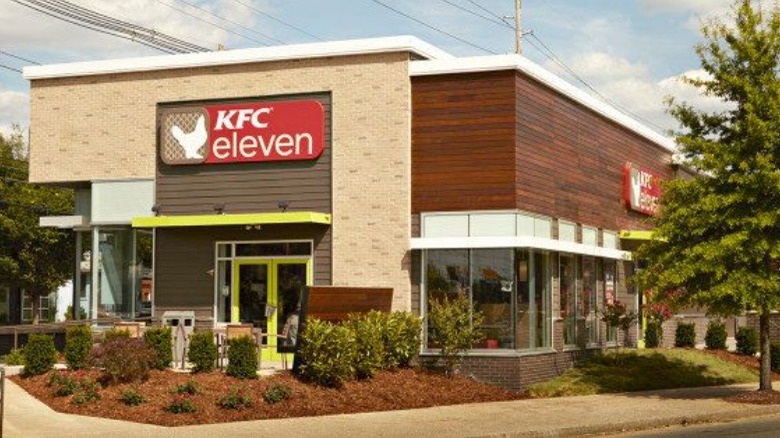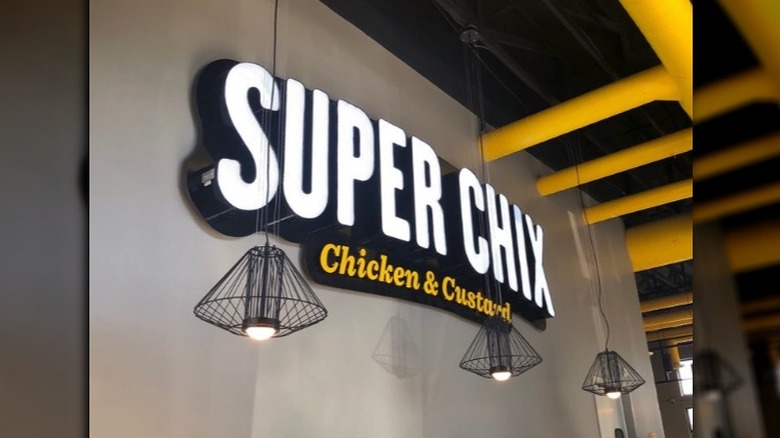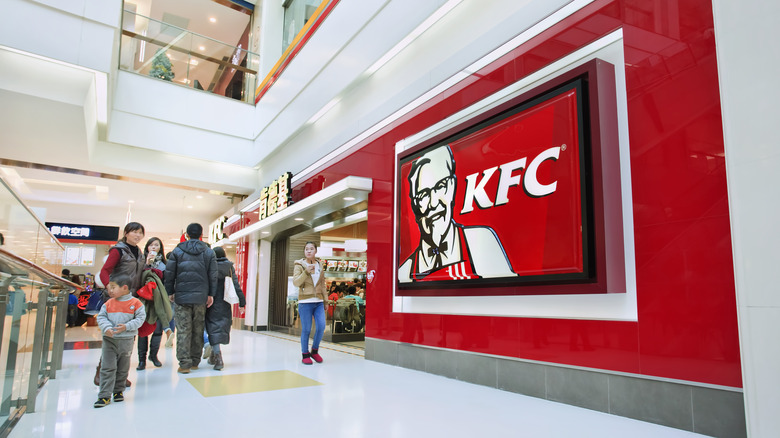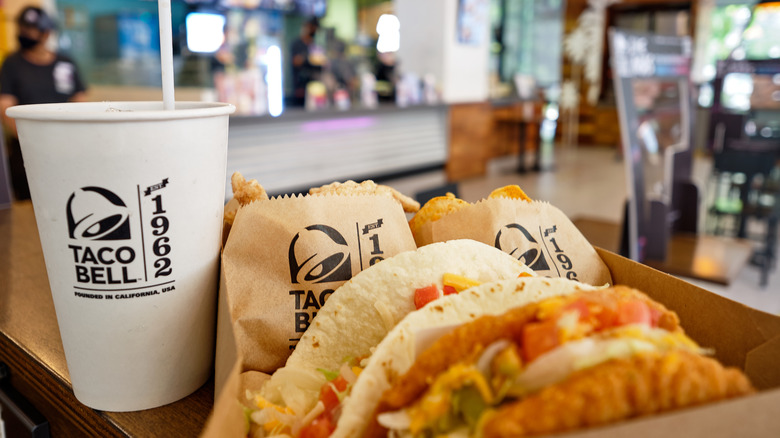The Untold Truth Of Yum Brands
Yum Brands (sometimes also spelled with the logo's enthusiastic exclamation point as "Yum! Brands") isn't a name the average consumer might use on a regular basis. No one says, "Oh, I want to go to the Yum Brands restaurant down the street for dinner tonight," for instance. But despite the brand's lack of visibility in our day-to-day vernacular, drive through just about every American town and you'll see evidence of Yum Brands' existence. The fast food corporation is most well-known as the parent company for KFC, Pizza Hut, and Taco Bell. According to Fortune, Yum Brands operates more than 50,000 restaurants across the globe, all from its headquarters in Louisville, Kentucky.
The Yum Brands story isn't one of rags to riches or small-town success gone national. In truth, Yum Brands was set up to succeed from the beginning, and it's done just that — but not without leaving a little bit of scandal in its wake. Here's the untold truth of Yum Brands, from the admirable to the infamous
Yum Brands has its roots in another mammoth company
Before Yum Brands was even conceived, PepsiCo stood in its shoes, overseeing fast food chains like Kentucky Fried Chicken, Taco Bell, and Pizza Hut as part of its restaurant division. PepsiCo had purchased Pizza Hut in 1977, Taco Bell in 1978, and KFC in 1986 (via Funding Universe). However, in 1997, PepsiCo made the decision to focus on soft drinks and Frito-Lay snacks, spinning the fast food restaurants off into their own company called Tricon Global Restaurants (via the Independent).
Even then, however, PepsiCo wouldn't break all its ties to the Yum Brands restaurants. Tricon, and now Yum Brands, had a lifetime contract with Pepsi, which is why you can now only find Pepsi products at Yum Brands restaurants. The only exception to this rule occurred when Yum Brands owned A&W Restaurants for a brief time, when Dr. Pepper-Snapple Group provided the restaurants with their A&W Root Beer, thanks to a prior contract (via Seafood Media Group).
Yum Brands didn't technically exist until 2002
Although the foundation for Yum Brands was established as early as 1977, with PepsiCo's first restaurant purchase as it acquired Pizza Hut, Yum Brands wasn't actually a brand at all until 2002, when Tricon Global Restaurants changed its name to Yum! Brands, Inc. At the time of the name change, leadership told QSR that the new name better reflected the brand's fun culture and the goal to "put a 'Yum' on customers' faces all around the world."
The same year that Tricon Global Restaurants changed its name to Yum Brands, the brand also acquired Long John Silver's and A&W All-American Food Restaurants, via a merger with the Lexington, Kentucky-based Yorkshire Global Restaurants. The merger added about a thousand A&W restaurants to Yum's portfolio and more than a thousand Long John Silver's restaurants. As QSR reports, the hope was that the merger would result in an added $5 billion in incremental system sales and $1 billion in new shareholder value.
Only a few Yum Brands restaurants have stuck around
Despite these hopes of additional sales and value, things didn't really work out between Yum Brands and Long John Silver's and A&W. After nine years, Yum Brands decided to sell the restaurants, with the chairman and CEO at the time saying that the two chains just didn't fit in with Yum's overall goals (via QSR). This was partially credited to the fact that Yum Brands was more into pushing its overseas growth, and neither restaurant had a presence overseas or the likelihood of growing one.
But Long John Silver's and A&W aren't the only brands that Yum picked up and dumped over the years; they're just the most well-known. Other brands that have gotten the boot include Back Yard Burgers and Pasta Bravo, both of which Yum Brands partnered with and then left after unsuccessfully trying to pair them with Pizza Hut locations (via Entrepreneur), and Super Chix, a chicken restaurant concept (via Nation's Restaurant News).
Yum Brands is still acquires other restaurants
Even though Pizza Hut, KFC, and Taco Bell have been Yum Brands' stalwart successes, the brand is undeterred from continuing to acquire other restaurant chains. Most recently, in 2020, Yum acquired The Habit Restaurants, Inc., parent company to The Habit Burger Grill. A California-based chain that's been around for more than 50 years, Habit Burger Grill is known for offering chargrilled burgers, chicken sandwiches, and ahi tuna sandwiches. As of 2019, according to a press release issued by Yum Brands, there were just about 300 Habit Burger Grill restaurants located in both the United States and China — a combination that was sure to appeal to Yum Brands, with its mammoth Chinese footprint. Over in the US, you can find Habit Burger Grill locations throughout 13 states, including those in the Southwest, Mid-Atlantic, and southern coastal states.
Another press release following the acquisition showed that Yum continues to expand Habit Burger Grill's international standing, with a new location opening in Cambodia in October 2020.
Yum Brands grew quickly in China
China was always a large market for Yum Brands, but by 2016, it was clear that Yum Brands' China operations were large enough to form their own corporation, and so Yum China was born. An independent company apart from Yum Brands, Yum China boasts exclusive rights to operating KFC, Pizza Hut, and Taco Bell locations in the country. Currently, Yum China claims that Pizza Hut is China's top casual dining restaurant brand and that KFC is the top quick-service restaurant brand in China. Regardless of the rankings, though, the numbers certainly don't lie. As of 2017, Yum China was operating more than 7,700 restaurants in the country, in more than 1,100 Chinese cities, employing over 420,000 individuals.
On top of the KFC, Pizza Hut, and Taco Bell brands, Yum China also operates Yum Brands' China-specific brands, such as East Dawning and Little Sheep. East Dawning was created by Yum Brands in the mid-2000s, using the KFC business model but serving Chinese cuisine (via The Wall Street Journal). Little Sheep, meanwhile, is a Chinese hot pot restaurant chain that Yum Brands purchased in 2011, according to China Perspective.
Yum Brands opened the first American fast food restaurant in the West Bank
Yum Brands' fast food prowess isn't only limited to China. To that end, Yum took its eats to the West Bank in 2012, opening the first American fast food restaurant ever in the Palestinian territory. Yum Brands can't take all the credit for this feat, though, as it all comes down to one especially daring entrepreneur.
The combination KFC and Pizza Hut, according to the Los Angeles Times, opened only after a Palestinian entrepreneur, Adeeb Bakri, worked around the demands of Israeli franchise owners, who insisted Palestinians go through Israeli companies to open branch restaurants like KFC and Pizza Hut. But, rather than working with the Israeli franchise owners, Bakri went straight to Yum Brands to get his own franchise. He was undeterred by concerns that Palestinians would boycott the two restaurants due to the United States' support of Israel, noting that the only thing he sourced from the Americans was the franchise and the recipes. He contended that everything else, from his employees to the food ingredients sourced for the restaurant, is Palestinian. There are now six KFC branches in Palestine alone.
In 2013, Yum Brands expanded into Mongolia
A year after the first KFC opened in the West Bank, Yum Brands took its western cuisine to Mongolia as part of an overarching effort to expand into Russia, Africa, and certain European countries, reported the Louisville Business Journal. The KFC restaurant in the capital city of Ulaanbaatar, Mongolia was one of five planned for the country, with further plans to open more than a dozen restaurants in Mongolia through 2018. Not only was this particular KFC location the first for the brand in the country, but it was also the country's first Western fast food restaurant. And if that weren't enough, Yum Brands also introduced the drive-thru concept to Mongolian diners.
Unfortunately, in 2019, all of the Mongolian KFC restaurants were suspended after hundreds of patrons contracted food poisoning and more than 40 diners were hospitalized (via CNBC). At that time, Yum Brands' franchise partners operated approximately 11 KFC restaurants in the country, not quite living up to the promises made after the 2013 initial opening. After that incident, the chain still appears to be operating in the country, with an active Instagram presence and a new restaurant in Ulaanbaatar debuting in April 2021 (via KFC).
Yum Brands was accused of using bad chicken
The food poisoning incident that marred KFC's reputation in Mongolia wasn't the first time that Yum Brands would come under fire for serving up potentially harmful food. In 2013, before Yum Brands spun off its Chinese operations into Yum China, the corporation was accused of using chicken with "excess levels of chemical residue" in its Chinese locations. The accusation came as part of a report on Chinese KFC restaurants' chicken suppliers. At the time, the Louisville Business Journal called China Yum Brand's largest and most profitable market. Regardless, Yum Brands still experienced a 6% decline in sales in China as a result of the bad publicity over tainted chicken.
In response, the chairman and CEO of the Chinese operations issued an apology for the brand's shortcomings in checking its own supply chains. After the incident, the Chinese government determined that the chicken used at the restaurants contained safe levels of antibiotics and steroids, but the "excessive levels of chemical residue" accusations were not denied at the time.
Yum Brands would also be accused of using tainted meat
Yum Brands' Chinese restaurants weren't out of the clear just yet, though. In 2014, Yum Brands' KFC and Pizza Hut locations throughout China would be involved in another Chinese meat scandal. As CNN reported, the issue began when a broadcaster secretly filmed inside Shanghai Husi Food, a food supplier that provided chicken and beef to not only KFC and Pizza Hut, but also McDonald's, Papa John's, and Burger King locations, among other restaurants in the nation.
In the secret video, viewers hear workers referring to meat on the processing line as "foul", see them touch it with their bare hands, and even witness some employees dropping the product on the floor before picking it up and returning it to the line. The workers were additionally seen taking expired meat out of old packaging and repackaging it with new expiration dates. After the scandal surfaced, KFC and Pizza Hut cut off all ties with the food supplier, but that still wasn't quite enough to keep the incident from making international headlines.
Yum Brands frequently tests fast food concepts that never make it
Over the years, Yum Brands has quietly tested fast food concepts in a handful of cities, only to abandon the concepts if they don't prove successful. One of these test concepts was a fast-casual version of KFC, which Yum Brands opened in its home city of Louisville, Kentucky. The concept, called KFC Eleven, opened in 2013 and stuck around for a mere two years, as the Courier Journal reports. The restaurant offered "healthy" options that you wouldn't normally find at a typical KFC restaurant, such as rice bowls and flatbreads, and was intended to be a slow dining experience where diners could sit down and stay awhile (and maybe make use of the free WiFi).
However, KFC Eleven ended up being just a test kitchen, more or less, allowing KFC teams to try out new menu items, kitchen designs, and service models for use in regular KFC locations. Once finished with the KFC Elevent concept, Yum Brands simply shut the restaurant down and transferred the employees to other KFC restaurants.
Another fast food concept was intended to compete with Chick-fil-A
Remember the aforementioned Super Chix, which Yum Brands tried out for a while and then sold? Well, Super Chix wasn't a restaurant that Yum bought and then abandoned as it did with Long John Silver's. Instead, Super Chix was Yum Brands' own chicken concept that it created alongside a local entrepreneur and then opened in Texas as a way to compete with Chick-fil-A. The menu focused on chicken strips and sandwiches, unsurprisingly enough, with frozen custard for dessert. The Dallas Observer reported that it was incredibly similar to the ultra-popular Chick-fil-A's menu offerings. But, alas, like some of its other restaurant concept brethren, Super Chix was not to last long in the Yum Brands family.
After just a year and two locations, Super Chix was sold to that local entrepreneur who helped get the idea off the ground in the first place (via Nation's Restaurant News). Today, the brand seems to be doing fine on its own without Yum Brands' help, with more than 15 locations around the southern and southwestern United States.
Yum Brands (basically) bought the Derby
Among all the different things and ideas that Yum Brands has acquired over its life, surely one of the oddest is the Kentucky Derby. In 2006, The Kentucky Derby sold its name to Yum Brands, taking the name of the Kentucky Derby from just that to, technically, "The Kentucky Derby presented by Yum! Brands" (via CNN).
The purchase came just four years after Yum Brands officially came into existence, breaking away from the Tricon Global Restaurants name, and was essentially a way to get the name out there to potential investors. At the time, a spokesperson noted that most individual investors already knew of KFC, Pizza Hut, and Taco Bell, but they didn't yet know Yum. Therefore, the purchase would put the Yum name out there and hopefully help the brand to grow its number of individual investors, with the spokesperson saying, "We currently have 20% of our shares held by individual investors. We'd like to increase that to 30% over time. Individual investors tend to be more loyal and they like to buy the stock of companies whose products they use."
By 2017, however, the deal was done. According to the Courier Journal, that's when Yum Brands stepped away from the sponsorship deal, allowing bourbon brand Woodford Reserve to step in as the next big corporate sponsor of the Derby.
Yum Brands earns high marks for its fight against hunger
Occasionally, big corporations like Yum Brands use their power for good — and that's exactly what Yum Brands is doing with its World Hunger Relief campaign. The campaign is the largest private-sector, hunger-focused fundraising campaign in the world, an effort that's so significant that the U.N.'s World Food Program USA calls vital to its work.
According to Yum, through fundraising at more than 43,000 restaurants since 2007, the corporation has raised more than $600 million in cash donations for the United Nations World Food Programme, which feeds up to 138 million people per year in more than 80 countries via more than 24 billion meals. The money that Yum Brands raises accounts for 2.4 billion meals since 2007, with every U.S. dollar raised in the effort going to provide four child-sized meals. Yum Brands takes donations for the fundraising campaign not only in its KFC, Pizza Hut, and Taco Bell locations but also via text.
Yum Brands is one of the world's largest restaurant companies
It's not difficult to believe that Yum Brands is one of the world's largest and most successful restaurant companies. According to Statista, Yum Brands boasts total assets of $5.85 billion (with the most valuable of its brands being KFC) and 50,353 restaurant units worldwide (with nearly half of those restaurant units being KFC locations). There are more than 2,000 franchisee partners, according to Yum, and more than 1.5 million Yum Brands employees.
But, as Yum Brands has grown, it's also paid close attention to its sustainability and diversity. In 2020, Yum Brands was added to the Dow Jones Sustainability North America Index for its fourth year and, in the same year, it was named a Top 100 Best Corporate Citizen by 3BL Media. In 2021, Yum Brands also launched the Yum! Center for Global Franchise Excellence, with a focus on educating franchisees and especially underrepresented people of color and women, helping them to pursue entrepreneurship. The center is part of an overall Yum Brands Unlocking Opportunity Initiative, which promises $100 million in investments to promote equity and inclusion.
Yum Brands wants to slash greenhouse gas emissions nearly in half
Yum Brands also aims to decrease the corporation's greenhouse gas emissions by 46% by 2030. According to QSR, efforts to meet this goal include reducing emissions on both the corporate and restaurant level, reducing emissions in Yum Brands' overall supply chain, switching corporate offices to renewable energy, reducing plastic waste, and highlighting plant-based menu items across its brands. By 2025, Yum Brands plans to only use recyclable, compostable, or reusable packaging at all Taco Bell locations worldwide. Taco Bell is also changing its menu to better highlight those plant-based menu items, while KFC and Pizza Hut are looking for plant-based alternatives like those offered from Beyond Meat.
Already, Yum Brands has achieved a goal of sourcing all its palm oil from third-party-approved sustainable sources. To those same ends, Yum Brands further wants to achieve net-zero emissions by 2050, a Restaurant Dive article noted.
